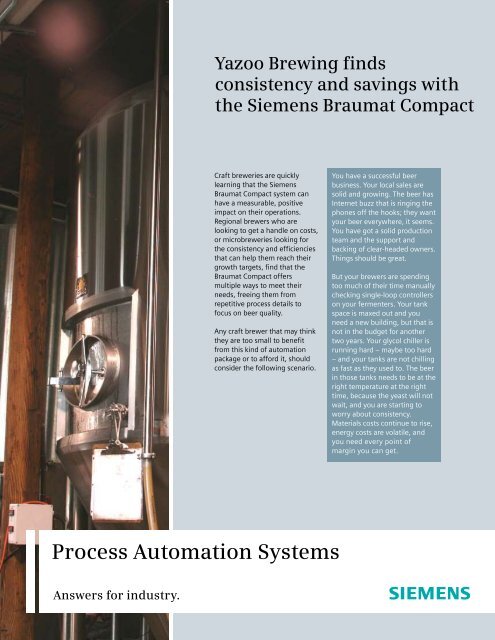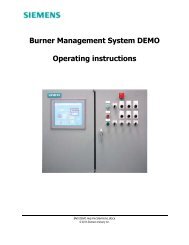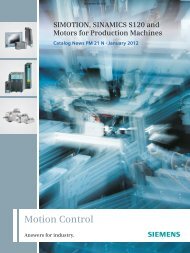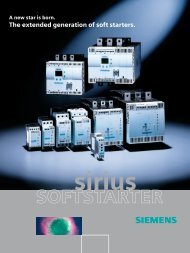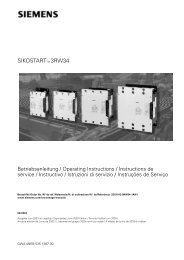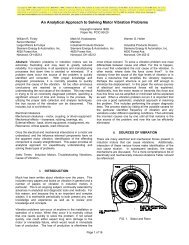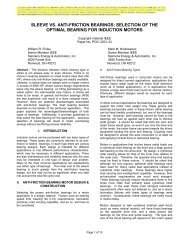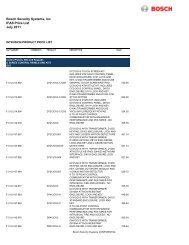Consistency and Savings with Siemens Braumat Compact
Consistency and Savings with Siemens Braumat Compact
Consistency and Savings with Siemens Braumat Compact
Create successful ePaper yourself
Turn your PDF publications into a flip-book with our unique Google optimized e-Paper software.
Yazoo Brewing finds<br />
consistency <strong>and</strong> savings <strong>with</strong><br />
the <strong>Siemens</strong> <strong>Braumat</strong> <strong>Compact</strong><br />
Craft breweries are quickly<br />
learning that the <strong>Siemens</strong><br />
<strong>Braumat</strong> <strong>Compact</strong> system can<br />
have a measurable, positive<br />
impact on their operations.<br />
Regional brewers who are<br />
looking to get a h<strong>and</strong>le on costs,<br />
or microbreweries looking for<br />
the consistency <strong>and</strong> efficiencies<br />
that can help them reach their<br />
growth targets, find that the<br />
<strong>Braumat</strong> <strong>Compact</strong> offers<br />
multiple ways to meet their<br />
needs, freeing them from<br />
repetitive process details to<br />
focus on beer quality.<br />
Any craft brewer that may think<br />
they are too small to benefit<br />
from this kind of automation<br />
package or to afford it, should<br />
consider the following scenario.<br />
You have a successful beer<br />
business. Your local sales are<br />
solid <strong>and</strong> growing. The beer has<br />
Internet buzz that is ringing the<br />
phones off the hooks; they want<br />
your beer everywhere, it seems.<br />
You have got a solid production<br />
team <strong>and</strong> the support <strong>and</strong><br />
backing of clear-headed owners.<br />
Things should be great.<br />
But your brewers are spending<br />
too much of their time manually<br />
checking single-loop controllers<br />
on your fermenters. Your tank<br />
space is maxed out <strong>and</strong> you<br />
need a new building, but that is<br />
not in the budget for another<br />
two years. Your glycol chiller is<br />
running hard – maybe too hard<br />
– <strong>and</strong> your tanks are not chilling<br />
as fast as they used to. The beer<br />
in those tanks needs to be at the<br />
right temperature at the right<br />
time, because the yeast will not<br />
wait, <strong>and</strong> you are starting to<br />
worry about consistency.<br />
Materials costs continue to rise,<br />
energy costs are volatile, <strong>and</strong><br />
you need every point of<br />
margin you can get.<br />
Process Automation Systems<br />
Answers for industry.
Linus Hall, founder/brewer at Yazoo Brewing in Nashville, found<br />
himself in that situation recently. “We’d outgrown our facility,”<br />
he said. “We couldn’t fit in any more tanks. I anticipated that<br />
we’d have to invest in a bigger chiller. We have some established<br />
brewers coming into our market, <strong>and</strong> if we don’t keep up our<br />
quality, our sales would drop off.”<br />
Faced <strong>with</strong> this situation, Hall talked to <strong>Siemens</strong> representative<br />
John Walker about the <strong>Siemens</strong> <strong>Braumat</strong> <strong>Compact</strong> system –<br />
which is based on Simatic PCS 7. “I thought it would be a while<br />
before we’d be big enough to use the system,” Hall said. Faced<br />
<strong>with</strong> the full capabilities of a product designed to h<strong>and</strong>le the<br />
world’s largest breweries – <strong>and</strong> based on a system capable of<br />
controlling entire chemical plants – Hall’s reaction was a natural<br />
one.<br />
But the keyword in the system’s name is <strong>Compact</strong>. The <strong>Braumat</strong><br />
<strong>Compact</strong> is that big brewery package, but scaled <strong>and</strong> optimized<br />
to run small to medium-sized breweries. It can be used to control<br />
the processes in one area or several, <strong>and</strong> it will grow right along<br />
<strong>with</strong> you, delivering big brewery process efficiencies all the way<br />
up to 200,000 barrels a year.<br />
Walker showed Hall how the scalability of <strong>Braumat</strong> <strong>Compact</strong><br />
made it possible to use it now for Yazoo’s pressing needs in<br />
fermenter temperature control. In the near future, that same<br />
scalability will make it easy to integrate all the process control<br />
aspects of Yazoo’s planned expansion: grain h<strong>and</strong>ling, mashing<br />
<strong>and</strong> lautering cycles, filtration, carbonation <strong>and</strong> cleaning-in-place<br />
(CIP).<br />
“When we build our new brewhouse,” Hall confirmed, “we’re<br />
going to use the system to control the brewing processes:<br />
mashing-in times, mash temperatures, <strong>and</strong> so on. We’ll just add<br />
the probes, automated valves, <strong>and</strong> such. That will be even easier<br />
than retro-fitting Yazoo’s fermentation cellar.”<br />
Smooth fermentation<br />
For now, though, Yazoo is using the <strong>Braumat</strong> <strong>Compact</strong> to run its<br />
fermentation program. The need was clear enough. “Our<br />
temperature controls were on individual tanks,” Hall said. “We<br />
had 20 tanks that we had to manually keep up. We drew up a<br />
schedule each day <strong>and</strong> had someone go to each tank <strong>and</strong> hold<br />
temperatures, ramp them up or down. One guy would spend half<br />
a day every day monitoring those tanks; not all the time, of<br />
course, but the responsibility.”
The time this consumed was bad enough<br />
when it worked perfectly, but it that was not<br />
always the case. Single-loop controllers are<br />
relatively cheap, but they are only as good as<br />
the consistent, constant actions of the<br />
brewer monitoring them by eye. “We’d have<br />
beers that were not down to filtering<br />
temperature by the time we wanted to filter,”<br />
Hall said. “Or maybe a tank was missed,<br />
overlooked for cooling <strong>and</strong> stayed at<br />
fermentation temperature for two weeks.”<br />
<strong>Braumat</strong> <strong>Compact</strong> changed all that. “We can<br />
see what’s going on in every tank from one<br />
central operator interface,” Hall said, <strong>and</strong><br />
that is just the beginning. The <strong>Braumat</strong><br />
<strong>Compact</strong> enables the user to create <strong>and</strong> store<br />
a digital collection – a library – of easily<br />
customized profiles of brews. It knows the<br />
fermentation regimen for each one of<br />
Yazoo’s beers <strong>and</strong> controls the temperatures<br />
on each tank over time to ensure consistent<br />
beer.<br />
Additionally, the pH measurements, <strong>and</strong><br />
specific gravity changes on every individual<br />
batch can be recorded <strong>and</strong> easily accessed as<br />
Excel-compatible files for quick inspection.<br />
That is not installed at Yazoo – yet – but the<br />
functionality is available <strong>and</strong> easily added.<br />
“We put in a profile for temperature control,<br />
say, for our wheat beer,” Hall explained. “We<br />
can have different profiles for each beer, one<br />
for the hefeweizen, one for the pale ale <strong>and</strong><br />
so on. The system is user-configurable. We<br />
can make changes to the temperature<br />
profiles ourselves <strong>and</strong> easily create new<br />
profiles – it’s easy to use.”<br />
“Once we put the profile in the library,” he<br />
continued, “we just choose which one we<br />
want <strong>and</strong> hit the start button. Then we don’t<br />
have to check it or change it or monitor it for<br />
two weeks. The profile controls at what rate<br />
the temperature rises. Before, we had<br />
someone checking temperatures every hour,<br />
but now the temperatures are being checked<br />
constantly.” If the temperature curves depart<br />
from the profile, alarms go off to prompt an<br />
eyeball check.<br />
A temperature profile can be set for the hotwash<br />
CIP, too. Hall recalled that a brewer<br />
forgot to turn off the manually-operated<br />
coolant flow to a tank after it was emptied of<br />
beer. As the hot solution entered the tank,<br />
the glycol flow was pulling down the<br />
temperature, putting stress on the chiller <strong>and</strong>
decreasing the effectiveness of the wash. Now the <strong>Braumat</strong><br />
profile will automatically shut down coolant flow when the tank<br />
is emptied, <strong>and</strong> monitor the temperature of the CIP program.<br />
Constant checking <strong>and</strong> constant glycol flow adjustment means<br />
smoother temperature curves that meet end-points on time.<br />
Batches that hit the right temperature at the right time mean<br />
more consistent beers <strong>and</strong> more efficient use of limited,<br />
expensive tank-space. When beer is always ready on time, always<br />
chilled to the proper temperature for filtering when it is time,<br />
more batches can be put through the same number of tanks in<br />
a year’s time.<br />
“Our time in tank is much more consistent now,” Hall said. “We<br />
haven’t had lags, we haven’t had to leave beer in the tank for a<br />
longer time because of errors or inconsistent temperature<br />
curves. In the past we’d average one of those once a month,<br />
so we save significant time on 12 to 15 batches a year.”<br />
Hall has not added the capability the <strong>Braumat</strong> has to track<br />
specific gravity. “It’s capable of it, but right now we’re doing that<br />
manually,” he said. Even so, being able to check <strong>and</strong> control the<br />
temperature profiles constantly has meant more consistency on<br />
fermentation times. Hall checks gravity once on the fifth day of<br />
fermentation, <strong>and</strong> says it’s typically done at the right time; if not,<br />
he can adjust the profile, give it a boost <strong>and</strong> get it finished.<br />
Brewing to that tight a schedule largely under the system’s<br />
control will automatically – pun intended – bring up the issue of<br />
craftsmanship. If the <strong>Braumat</strong> <strong>Compact</strong> is repeating the process<br />
identically every time, is the beer still “crafted”<br />
Hall does not see that as a problem. “If you’re taking the<br />
variability out of what you’re doing,” he said, “I don’t think it<br />
takes the craft out of it. There have been enough variables in<br />
barley, hops <strong>and</strong> water in the past few years. If you can take<br />
variability out at some point, that’s good. Automation doesn’t<br />
make good beer . . . people make good beer. Automation can<br />
help people make more good beer, on a more repeatable basis”<br />
Chilling results<br />
More efficient temperature controls do not just result in fewer<br />
man-hours spent checking fermentation tanks <strong>and</strong> more<br />
consistent beer quality. The constant glycol flow adjustment<br />
allowed by the <strong>Braumat</strong> <strong>Compact</strong> takes stress off Yazoo’s glycol<br />
chiller.<br />
“We noticed before we added the system that we’d have a hard<br />
time getting the tanks down to the temperature we wanted,”<br />
Hall said. “We were chilling them by just manually opening the<br />
valves wide-open on three tanks. The glycol would run through<br />
the one tank first, which would cool the tank, but it would also<br />
warm up the glycol, <strong>and</strong> the other two tanks would suffer.”<br />
The chiller would also suffer, running flat-out to recover from<br />
constant peak dem<strong>and</strong>s. It looked like Yazoo needed a bigger<br />
chiller.
It turned out that the size of the chiller was not the problem, it<br />
was the spikes <strong>and</strong> drops in dem<strong>and</strong>. “With the <strong>Siemens</strong> system,<br />
we can control the rate that the tank chills down,” Hall<br />
explained. “We set it to drop at maybe one degree per hour. It<br />
completely changed the dem<strong>and</strong>s on the chiller. I had anticipated<br />
we’d have to invest in a chiller, maybe $20,000, but it ran a lot<br />
better last year. So the <strong>Braumat</strong> <strong>Compact</strong> saved us from buying a<br />
new chiller.”<br />
The <strong>Braumat</strong> <strong>Compact</strong> adapts <strong>and</strong> calculates how rapidly a<br />
certain-sized batch of beer will cool in each tank (as it similarly<br />
saves data on how fast a given volume <strong>and</strong> weight of mash will<br />
heat in the brewhouse) <strong>and</strong> adjusts glycol flow to optimize the<br />
temperature change over time. Brewers can also adjust the on/<br />
off range around set-points to cut down on excess cycling. Valveactuating<br />
solenoids might be cheap, but getting them out <strong>and</strong><br />
replacing them often is not.<br />
Running the chiller is not free, either: Power costs money, <strong>and</strong><br />
utility companies are starting to charge stiff premiums for heavy<br />
usage during times of peak power dem<strong>and</strong>, a trend that is bound<br />
to broaden <strong>and</strong> increase. Yazoo is lucky; it buys its electricity<br />
from the Tennessee Valley Authority at rates substantially lower<br />
than the national average. Still, Hall can save money <strong>with</strong> the<br />
<strong>Braumat</strong> <strong>Compact</strong>’s ability to easily set maximum energy usage,<br />
like building the ice bank, for off-peak hours.<br />
“It levels out your electric dem<strong>and</strong>,” he said. “It’s not so bad here<br />
in Tennessee, but where I used to work, we had to stagger all<br />
our dem<strong>and</strong>s. Now, we can actually schedule the cooling of the<br />
tanks to happen at night. It’s a better environment for it, better<br />
than trying to do it in the heat of a Nashville summer day.”
Change for the better<br />
The <strong>Braumat</strong> <strong>Compact</strong> has had a solid impact on Yazoo Brewing’s<br />
bottom line. “It put off the investment in a new chiller,” Hall said.<br />
“We were also able to hold off adding another assistant brewer;<br />
that’s probably $35,000 - $40,000 a year.”<br />
“What it’s really saved us is time,” he emphasized, “<strong>and</strong> <strong>with</strong> our<br />
growth, we’ve been able to better use those hours in other areas.<br />
We’ve been able to improve our cleaning regimen, for example,<br />
<strong>and</strong> we’re in a competitive market: consistency keeps your sales<br />
up. When you’re growing quickly, any time saving freed up for<br />
extra work produces more beer.”<br />
“It’s really improved the quality <strong>and</strong> the consistency of our<br />
beers,” Hall continued. “The more finicky yeast strains are more<br />
dependent on the temperature, <strong>and</strong> we’ve been able to get more<br />
consistency <strong>with</strong> that. Once you figure out the best way to do it,<br />
it gets done every time, no matter who’s brewing. I’m hoping we<br />
can double or even quadruple production <strong>with</strong> the same<br />
manpower.”<br />
Alarming problems<br />
This is all wonderful stuff when everything is working. The<br />
<strong>Braumat</strong> <strong>Compact</strong> sits in its box, reaching out through data<br />
networks to operate valves, pumps, <strong>and</strong> switches, while<br />
recording all the data on how processes proceed, so brewers<br />
can monitor <strong>and</strong> evaluate the different brews.<br />
When something goes wrong, how does the system cope Some<br />
things are h<strong>and</strong>led easily, just because of the <strong>Braumat</strong> panel<br />
putting all the readouts in one, conveniently-viewed place.<br />
“There have been cases where a valve was stuck open,” Hall<br />
recalled, “but you walk by <strong>and</strong> see that flashing, <strong>and</strong> you go<br />
fix it.”<br />
It does not even have to be a brewer. “I ask our tasting room<br />
employees to run back <strong>and</strong> look at the system on Saturdays,” Hall<br />
said. “It’s easy to know if something’s wrong, you can see the<br />
error lights flashing. And one weekend, a fuse had blown on the<br />
glycol compressor, but the circulating pump was still running.<br />
Instead of chilling, it was warming the beer! It would have ruined<br />
17 tanks of beer, but he called me <strong>and</strong> I came in <strong>and</strong> re-set the<br />
chiller, <strong>and</strong> everything was great.” The system saved Yazoo about<br />
$67,000 worth of beer that day.<br />
There are some more intangible benefits, too. “It’s really helped<br />
in communicating what’s going on,” Hall noted. “Anyone in the<br />
brewery can walk by <strong>and</strong> see how each brew is doing. Before, we<br />
had to communicate between shifts what was going on. Having<br />
the <strong>Braumat</strong> <strong>Compact</strong> also boosted everyone’s perception of<br />
what we are as a brewery. Before it was like we were just a<br />
bunch of homebrewers, cranking out 10 bbls. of beer. Now<br />
we’re thinking, hey, we are professional brewers, working on<br />
professional systems. It raised everyone’s st<strong>and</strong>ards.”<br />
As Yazoo grows, <strong>Braumat</strong> <strong>Compact</strong> will grow <strong>with</strong> it, offering<br />
new savings <strong>with</strong> every additional process it controls or increase<br />
in capacity. The system offers the benefits of a large brewery’s<br />
automation infrastructure at a price <strong>and</strong> ROI that suits a smaller<br />
brewery. It pays for itself in improved production efficiency <strong>and</strong><br />
increased throughput. Best of all, it lets the brewer keep control<br />
of the quality <strong>and</strong> consistency of the only thing that matters:<br />
the beer.<br />
If the valve sticks, or the fuse blows at 2 a.m. on Sunday morning<br />
that could be more of a problem, but the <strong>Braumat</strong> is on the job,<br />
24/7. The system is capable of e-mail or text message alerts.<br />
“We’re going to get in some e-mail alerting ability,” Hall said.<br />
Depending on the problem, someone may not even have to go in<br />
to fix it. Real-time remote monitoring can be done on a home<br />
computer, <strong>and</strong> anything that can be done from the control<br />
interface screen at the brewery, can be done remotely –<br />
all <strong>with</strong> appropriate security layers, of course.
Getting up <strong>and</strong> running<br />
Getting the system installed <strong>and</strong> functioning was easier than<br />
Linus Hall had imagined. Once the decision to implement the<br />
system was made, John Walker told Linus about the <strong>Siemens</strong>’<br />
network of Solution Partners that specialize in the configuration,<br />
implementation, <strong>and</strong> installation of process systems. These<br />
Solution Partners are systems integrators grouped by industry<br />
expertise. Using a company <strong>with</strong> brewing <strong>and</strong> <strong>Braumat</strong> <strong>Compact</strong><br />
expertise can drastically reduce the cost <strong>and</strong> risks associated<br />
<strong>with</strong> implementation of specialized systems. Linus decided to<br />
partner <strong>with</strong> Prism Systems from Mobile, Alabama. Prism is a<br />
long-time <strong>Siemens</strong> partner <strong>and</strong> is one of a select group of<br />
<strong>Braumat</strong> <strong>Compact</strong> systems integrators in the U.S.<br />
Prism worked <strong>with</strong> <strong>Siemens</strong> <strong>and</strong> Yazoo to determine the specific<br />
needs of the brewery <strong>and</strong> tailored a solution to meet Yazoo’s<br />
needs <strong>with</strong>out breaking their budget. Keith Jones <strong>with</strong> Prism<br />
said, “It is important, when implementing a system like this, to<br />
make sure that you listen to the wants <strong>and</strong> needs of the<br />
customer. These systems can have a huge impact in a brewery<br />
where there may have been little automation in the past. For big<br />
changes like this, we need to make sure we get it right the first<br />
time. It is very rewarding to play an integral part in helping<br />
another business flourish.”<br />
For Yazoo, the immediate desire was to gain better control of the<br />
fermentation area. Prism developed the fermentation block for<br />
Yazoo that <strong>Braumat</strong> uses to control the temperature profiles for<br />
the fermentation tanks. Once this block was written, it was then<br />
incorporated into the system <strong>and</strong> became a tool that any user of<br />
<strong>Braumat</strong> <strong>Compact</strong> can utilize. For implementing the system,<br />
Prism <strong>and</strong> <strong>Siemens</strong> worked <strong>with</strong> Linus to customize the<br />
functionality for the Yazoo. Prism then implemented the<br />
software.<br />
There is still a little more to adding a control system than just<br />
buying the controller <strong>and</strong> programming it. For instance, to<br />
control a fermentation tank, sensors are needed to read the<br />
temperature, <strong>and</strong> automated valves are required to send chilled<br />
water to the jacket of the fermentation tank. These devices must<br />
be wired back to the location where the I/O modules reside.<br />
Prism helped Yazoo decide which sensors were needed <strong>and</strong> then<br />
took responsibility for wiring the system.<br />
Once up <strong>and</strong> running, support <strong>and</strong> training are easy to<br />
accomplish. The <strong>Braumat</strong> <strong>Compact</strong> system is running Windows<br />
XP. Using st<strong>and</strong>ard software, Prism can connect to the computer<br />
when issues or questions arise. Yazoo has 24-hour access to a<br />
system expert!
<strong>Siemens</strong> Energy & Automation, Inc.<br />
Industry Sector<br />
3333 Old Milton Parkway<br />
Alpharetta, GA 30005<br />
1-800-964-4114<br />
info.sea@siemens.com<br />
www.sea.siemens.com/process<br />
Subject to change <strong>with</strong>out prior notice<br />
Order No.: PAFL-00120-0409<br />
All rights reserved<br />
Printed in USA<br />
©2009 <strong>Siemens</strong> Energy & Automation, Inc.<br />
The information provided in this brochure contains merely<br />
general descriptions or characteristics of performance<br />
which in case of actual use do not always apply as described<br />
or which may change as a result of further development<br />
of the products. An obligation to provide the respective<br />
characteristics shall only exist if expressly agreed in the<br />
terms of contract.<br />
All product designations may be trademarks or product<br />
names of <strong>Siemens</strong> AG or supplier companies whose use by<br />
third parties for their own purposes could violate the rights<br />
of the owners.


